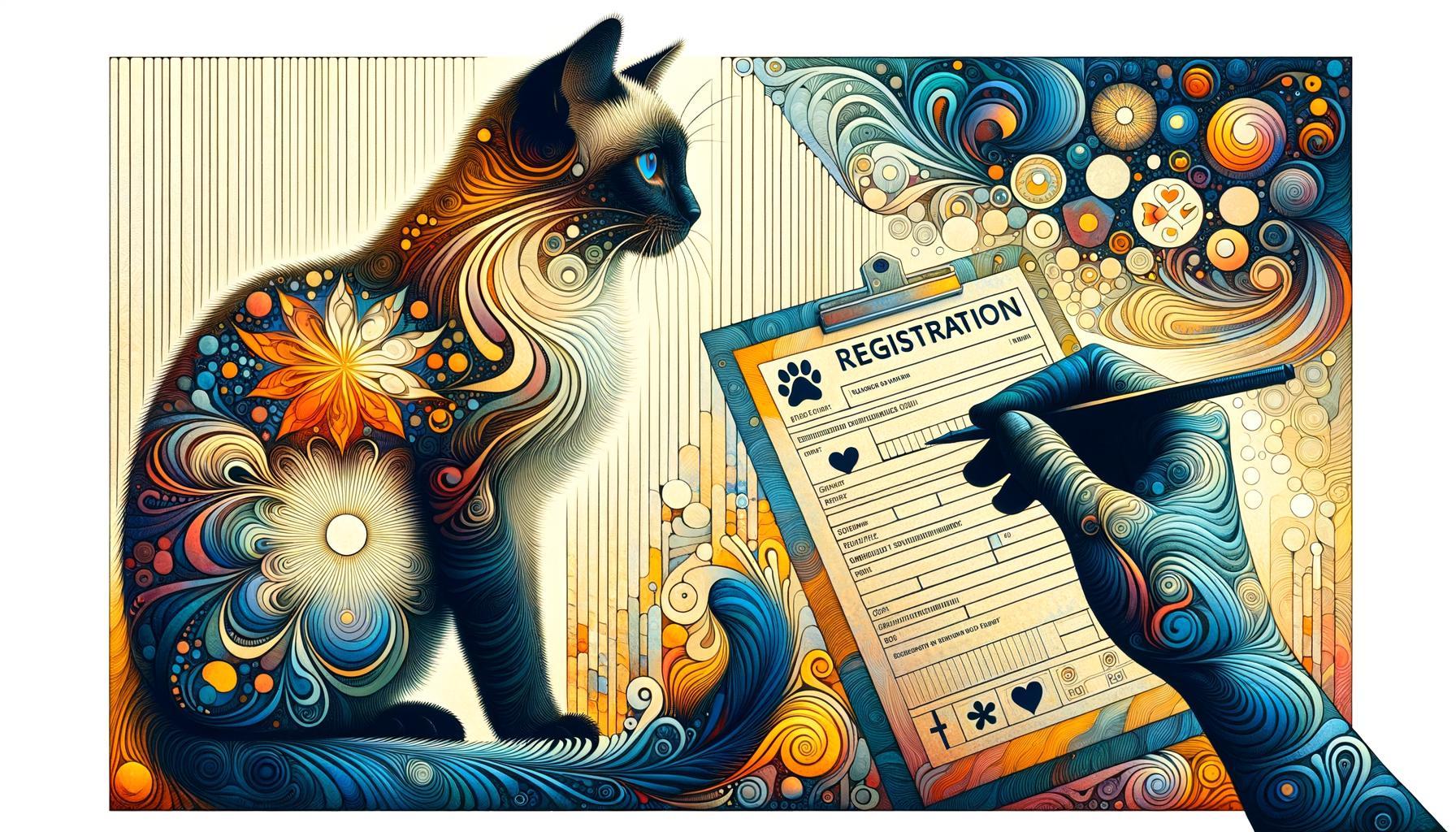Nestled within the purrs and the soft, undulating rhythms of a cat’s movement is a wonderment that borders on the ethereal. For many, feline companionship transcends mere affection, serving as a balm for the weary soul. But what happens when your cat isn’t just a confidant in times of distress but becomes a crucial pillar in your mental well-being? Enter the realm of Emotional Support Animals (ESAs), where the comforting presence of your feline friend is recognized and protected by unique legalities. This article, “Counting the Cost: Registering Your Cat as an ESA,” delves into the often-overlooked nuances of the ESA registration process, carefully dissecting its emotional and financial implications. Join us as we traverse this path, balancing the scales between necessity and expenditure, and discover what it truly means to formalize your feline’s role as a designated guardian of your emotional health.
Table of Contents
- Understanding Emotional Support Animals and Their Role
- Navigating the Legal Requirements for ESA Registration
- Assessing the True Costs of Certification and Care
- Choosing Between Online and Professional Resources
- Evaluating the Benefits of Registering Your Cat as an ESA
- Wrapping Up
Understanding Emotional Support Animals and Their Role
Emotional Support Animals (ESAs) provide their owners with a unique form of therapeutic companionship that extends beyond the mere presence of a pet. Unlike service animals, which receive specialized training to perform specific tasks, ESAs are valued for their inherent ability to offer comfort, alleviate anxiety, and provide emotional stability. This bond between humans and their emotional support animals can lead to significant improvements in the emotional and psychological well-being of the owner. **Cats, in particular, excel as ESAs** due to their intuitive nature and ability to adapt to various environmental changes, making them reliable companions for those in need of emotional support.
Understanding the role of ESAs also involves acknowledging the legal and social frameworks that govern their acceptance and registration. **Key aspects of their role include:**
- **Providing constant companionship and emotional comfort**
- **Offering a sense of security, reducing anxiety, and minimizing feelings of loneliness**
- **Helping owners manage symptoms of mental or emotional disorders**
To officially register your cat as an ESA, it’s essential to follow proper protocols, which include obtaining a letter from a licensed mental health professional. This documentation not only legitimizes the cat’s status but also ensures its acceptance in housing and transport contexts. Below is a simplified table outlining the main benefits of registering your cat as an ESA:
| **Benefit** | **Explanation** |
|---|---|
| **Housing Rights** | Ensures your cat can live with you even in no-pet housing |
| **Travel Accommodations** | Permits your cat to travel with you in-cabin on most airlines |
| **Emotional Stability** | Continuous support in managing mental health conditions |
Navigating the Legal Requirements for ESA Registration
Successfully registering your feline companion as an Emotional Support Animal (ESA) involves navigating a maze of **legal requirements**. To start, it’s important to know that you cannot simply “register” your cat online through unofficial websites that promise instant certification. Legitimate ESA documentation requires a **letter from a licensed mental health professional** attesting that your cat provides essential emotional support. This letter must include specific details about your condition, how the animal helps you, and the professional’s license information. Always ensure your mental health professional is well-versed in ESA regulations to avoid potential pitfalls.
When considering travel or housing, additional legal stipulations might apply. For **housing**, ESA owners benefit from **Fair Housing Act (FHA)** protections, which mandate that landlords accommodate ESAs without extra fees. However, the act requires proper documentation. In contrast, when flying, you’ll need to be familiar with the **Air Carrier Access Act (ACAA)**. Airlines have their own forms and requirements, so consult them well ahead of your trip to avoid surprises. Below is a comparison table summarizing legal requirements for housing and travel:
| Aspect | Housing | Travel |
|---|---|---|
| Governing Act | Fair Housing Act (FHA) | Air Carrier Access Act (ACAA) |
| Documentation Required | Letter from Mental Health Professional | Airline-Specific Forms |
| Fees | None | Variable, Check with Airline |
Assessing the True Costs of Certification and Care
When considering the expenses associated with registering your feline friend as an Emotional Support Animal (ESA), it’s crucial to dive deep into the actual costs involved. One might initially think that the registration fee is the primary concern; however, the reality extends beyond mere paperwork. **First and foremost, vet visits** are a significant part of the certification journey. Ensuring your cat is in peak health is not only a requirement but a responsibility, which can mean routine check-ups, necessary vaccinations, and possible health screenings.
- Veterinary Consultations: Initial and follow-up visits.
- Vaccinations: Keeping up-to-date with required shots.
Beyond the initial health expenditures, the costs associated with an ESA cat extend into everyday care and maintenance. **Specialized diets** are often recommended to keep your feline in top shape, especially if they are providing emotional support. Moreover, some living conditions or housing agreements may necessitate additional fees or deposits.
| Item | Approximate Cost |
|---|---|
| Registration Fee | $75-$150 |
| Initial Veterinary Visit | $50-$200 |
| Monthly Specialized Diet | $30-$70 |
| Housing Pet Deposit | $100-$500 |
Understanding these expenses can help you budget effectively and ensure that your journey with your ESA cat remains a comforting and supportive experience for both you and your furry companion.
Choosing Between Online and Professional Resources
When you’re navigating the requirements for registering your cat as an Emotional Support Animal (ESA), you will have to choose between **online services** and **professional resources**. Online platforms often offer a more convenient and budget-friendly avenue; you can complete most of the process from the comfort of your home. These services typically provide digital certificates and various forms of documentation that landlords or airlines might require. However, you must be cautious of scams and unwarranted promises. Make sure to verify the legitimacy of any online service through reviews and possibly consult others who have used the platform.
Professional resources, on the other hand, bring a level of **expertise and assurance** that can be invaluable. These can range from consulting with your local veterinarian to seeking assistance from a licensed therapist. The process may be more thorough and sometimes pricier, but you’re more likely to receive tailored guidance and a legitimate ESA letter. Additionally, professional resources offer the advantage of face-to-face consultations, which can provide more detailed insights into regulations and specific needs. Here’s a quick comparison of both options:
| Criteria | Online Services | Professional Resources |
|---|---|---|
| Cost | Generally cheaper | Can be more expensive |
| Convenience | Highly convenient | Requires appointments |
| Verification | May vary | Generally verified |
Evaluating the Benefits of Registering Your Cat as an ESA
Imagine transforming your feline companion into a legitimate source of emotional support. Registering your cat as an Emotional Support Animal (ESA) comes with a myriad of tangible benefits. One key advantage is the legal protection it offers. ESA status provides your furry friend with the right to live with you, even in housing situations where pets are generally not allowed. This can significantly ease the burdens of pet-related housing restrictions and potential pet fees. Additionally, ESAs often receive special consideration during travel, reducing the stress associated with pet transportation.
Moreover, the psychological and emotional benefits are immeasurable. An ESA can have a profound impact on your mental health, offering a sense of comfort and companionship. For those with diagnosed emotional or mental health conditions, an ESA serves as a steady source of support and stability. The process of obtaining an ESA letter from a licensed mental health professional can also validate and acknowledge your emotional needs, creating an official framework for your mental health journey.
Wrapping Up
And so, dear reader, as you stand at the crossroads of decision, pondering the prospects of registering your feline friend as an Emotional Support Animal, remember that this journey is uniquely yours to navigate. The costs, both tangible and intangible, weave the tapestry of a commitment that extends beyond mere financial expenditure. Consider the love, companionship, and comfort that your whiskered confidant offers—a treasure that often transcends the weight of monetary measures.
Whether you embark on this path or choose an alternative one, what remains unwavering is the bond you share with your cat. A bond built on trust, understanding, and the gentle nudges of a paw seeking solace on your lap. the choices you make echo not only through your life but also through the soft purrs and gleaming eyes of your devoted companion.
Navigate wisely, and may your decisions bring warmth to your heart and peace to your home.







Leave a Reply